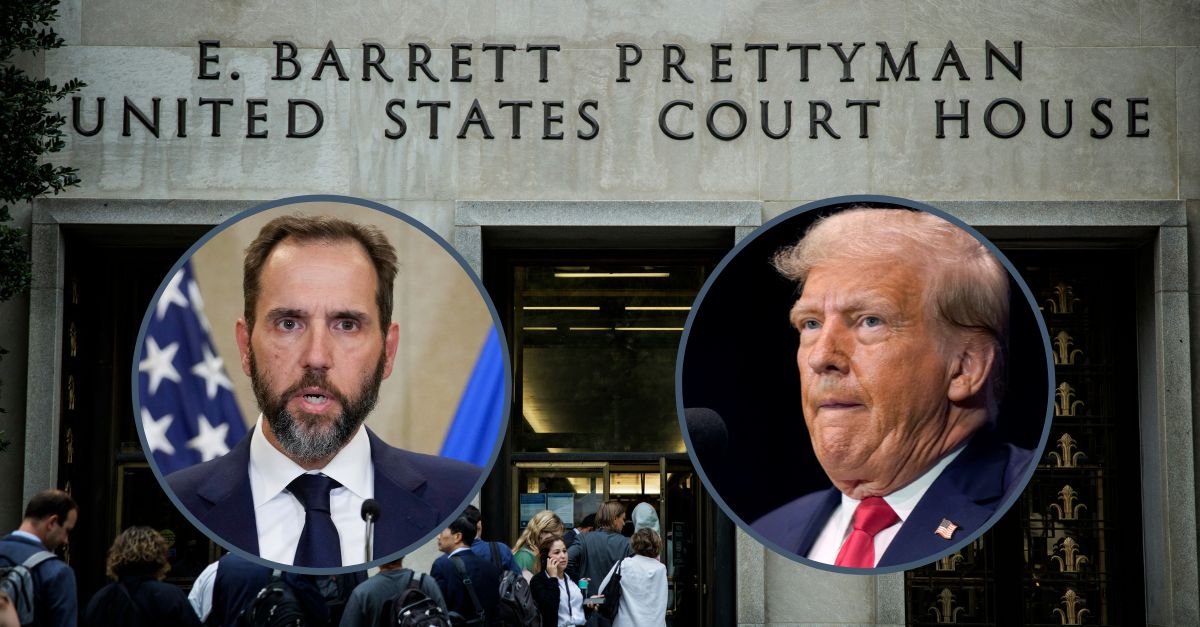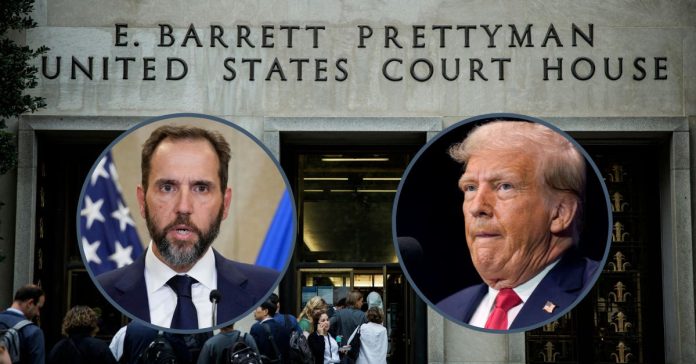
Reporters line up as they enter the E. Barrett Prettyman United States Courthouse ahead of former President Donald Trump’s arraignment in federal court on Aug. 3, 2023, in Washington, D.C. (Photo by Samuel Corum/Sipa USA)(Sipa via AP Images). Inset left: Special counsel Jack Smith speaks to the media about an indictment of former President Donald Trump, Tuesday, Aug. 1, 2023, at an office of the Department of Justice in Washington (AP Photo/J. Scott Applewhite). Inset right: Former President Donald Trump addresses an audience during a campaign event, Monday, Oct. 9, 2023, in Wolfeboro, N.H. (AP Photo/Steven Senne)
Federal appeals court judges in Washington, D.C., have approved a lower court’s decision to allow special counsel Jack Smith to secretly serve a search warrant for the Twitter file of former President Donald Trump and bar the social media platform from telling the former president about it — but not without some pushback by some Trump-appointed judges.
The U.S. Circuit Court for the District of Columbia denied a request from X — the social media platform formerly known as Twitter — to review a three-judge panel’s affirmation of a lower-court ruling in favor of the special prosecutor’s decision to serve a search warrant on Elon Musk’s company to access Trump’s file, including direct messages and drafts. The warrant was served in January in connection with Smith’s investigation into Trump’s alleged interference with the peaceful transfer of power, which culminated in the Jan. 6 attack on the U.S. Capitol as Congress met to certify President Joe Biden’s electoral win.
As Law&Crime previously reported, Smith served the court-approved warrant on X on Jan. 17, 2023. The existence of that warrant was kept secret from the former president himself via a nondisclosure order, as Smith had successfully argued to U.S. District Judge Beryl Howell that Trump may interfere with the investigation if he knew about the warrant.
Twitter escalated the issue to the U.S. Circuit Court for the District of Columbia, and a three-judge panel — U.S. Circuit Judges Florence Pan and J. Michelle Childs, both Biden appointees, and Cornelia T.L. Pillard, a Barack Obama appointee — affirmed Howell’s decision in July.
Musk’s Twitter sought a rehearing en banc, which the judges denied in a per curiam order on Monday.
But four judges — Trump appointees Neomi Rao, Gregory G. Katsas, and Justin R. Walker, along with George H.W. Bush appointee Karen LeCraft Henderson — disagreed with the majority’s decision, largely on executive privilege grounds. Rao wrote a statement expressing her reasons for disagreeing with the decision, in which the three other judges joined.
“The Special Counsel’s approach obscured and bypassed any assertion of executive privilege and dodged the careful balance Congress struck in the Presidential Records Act,” the statement says. “The district court and this court permitted this arrangement without any consideration of the consequential executive privilege issues raised by this unprecedented search. We should not have endorsed this gambit.”
Rao noted that Howell failed to recognize that Trump’s Twitter file was “presumptively privileged,” and that she should have allowed the former president to assert an executive privilege claim over the material.
Trump himself, however, did not assert such a claim when he learned of the search warrant — a fact that Rao did acknowledge before proceeding with her statement about that very issue.
“The options at this juncture are limited. Once informed of the search, President Trump could have intervened to protect claims of executive privilege, but did not, and so these issues are not properly before the en banc court,” she wrote. “Nonetheless, executive privilege is vital to the energetic and independent exercise of the President’s Article II authority and to the separation of powers. While the privilege may yield to the needs of a criminal investigation, in making this determination, the Supreme Court and this circuit have always carefully balanced executive privilege against other constitutional interests. By contrast, the court here permitted a special prosecutor to avoid even the assertion of executive privilege by allowing a warrant for presidential communications from a third party and then imposing a nondisclosure order.”
Howell and the appellate court, Rao says, “break with longstanding precedent and gut the constitutional protections for executive privilege.”
Rao said that because Trump “used his Twitter account to conduct official business,” the contents of that account could have contained privileged material — a possibility “vigorously maintained” by Musk’s company.
“The district court dismissed the concerns about executive privilege and also questioned the company’s motives in raising claims on behalf of President Trump,” Rao also says, writing in a footnote that Howell asked attorneys for Twitter if they were litigating the case only because “the CEO wants to cozy up with the former President.”
“Under longstanding precedent, however, the Special Counsel should not have been allowed to evade an assertion of presidential privilege simply by issuing the warrant to a third party — ‘it is, after all, the President’s information.””
Twitter had initially refused to comply with the search warrant, claiming that a nondisclosure order that accompanied the warrant preventing Twitter from telling anyone “about the existence or contents of the warrant” was unconstitutional. After a few rounds of back-and-forth with prosecutors and Howell, Twitter did ultimately comply, on Feb. 9. But because that compliance came days after a court-ordered deadline, Howell found the social media giant in contempt of court and issued $350,000 in sanctions.
The federal docket of the case, now before U.S. District Judge James Boasberg, instructs the parties to file a joint status report within 10 days of the appeals court ruling.
Rao ended her statement with a reference to conservative judicial idol Supreme Court Justice Antonin Scalia — and a warning.
“Not every ‘wolf comes as a wolf,’” Rao wrote, quoting Scalia in a dissent from a 1988 case. “Perhaps the threat here was hard to spot. Nevertheless, judicial disregard of executive privilege undermines the Presidency, not just the former President being investigated in this case.”
Have a tip we should know? [email protected]

